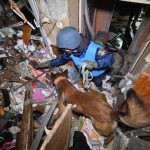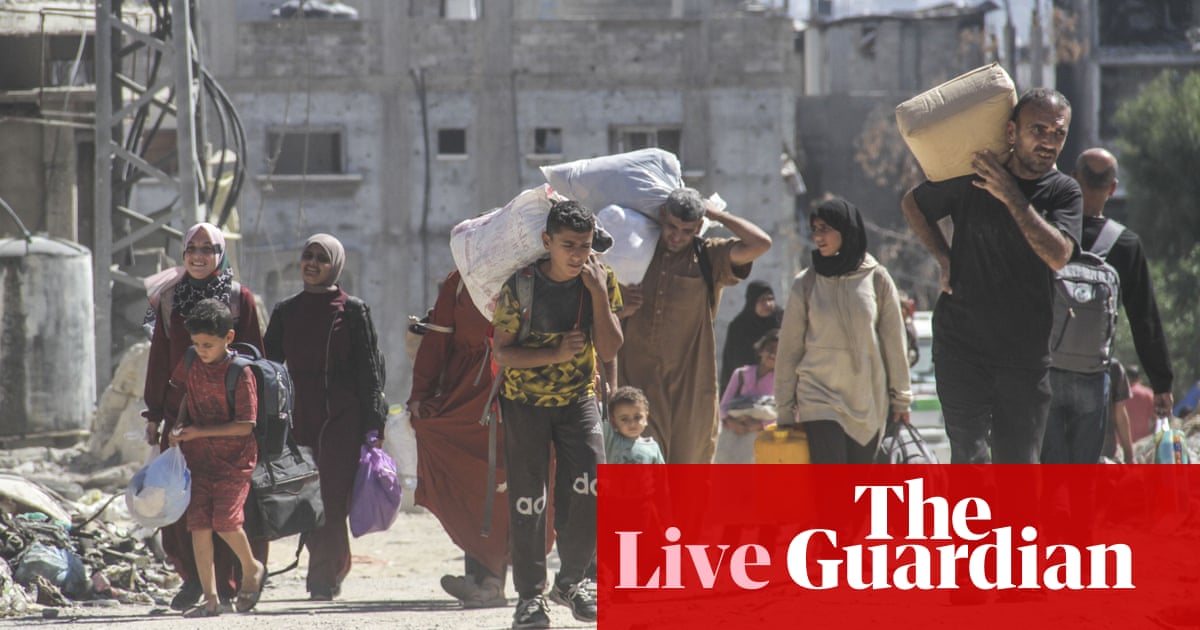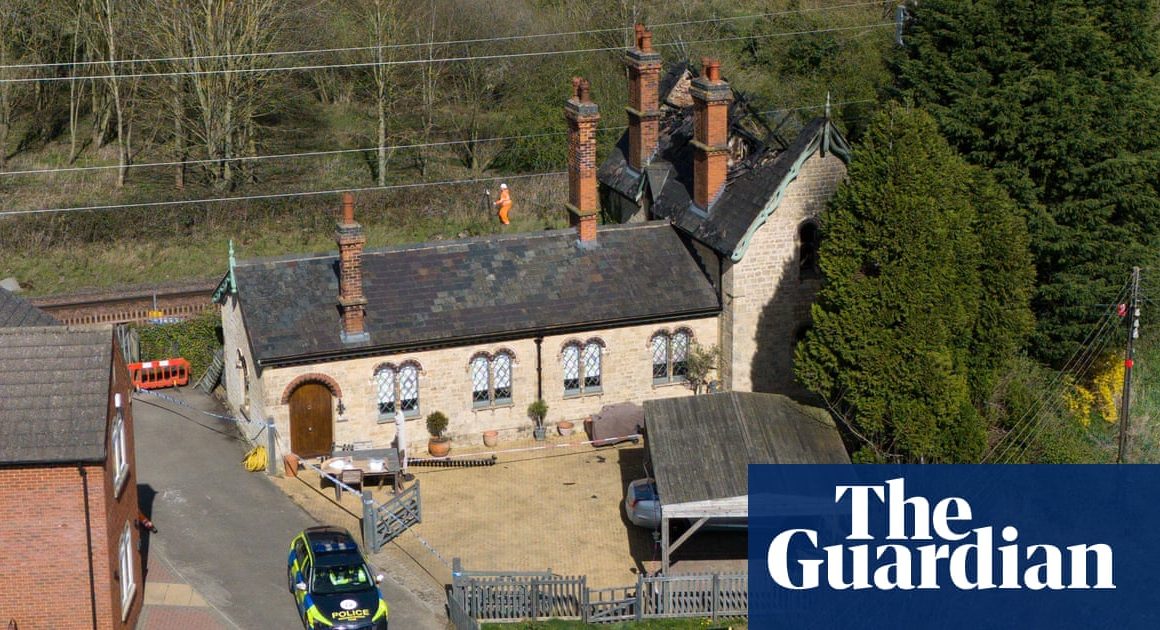Iran says it has warned UN nuclear watchdog about Israeli threats against its nuclear sites
Iran has warned the UN nuclear watchdog about Israel’s threats against its nuclear sites, foreign ministry, spokesperson Esmaeil Baghaei said on Monday at a weekly news conference.
Israel has vowed to attack Iran in retaliation for a volley of Iranian missiles launched on 1 October, leading to widespread speculation that Iran’s nuclear sites could be among Israel’s targets.
“Threats to attack nuclear sites are against UN resolutions …. And are condemned … we have sent a letter about it to … the UN nuclear watchdog,” Baghaei said in the televised news conference.
Key events
The Israeli military has apologised over a strike that killed three Lebanese soldiers in southern Lebanon the previous day, AP reported.
It said it is not battling the Lebanese military, and claimed its soldiers believed they were targeting a vehicle belonging to the Hezbollah militant group.
Last week, Hezbollah said it is entering a new phase in its fight against invading Israeli troops, as the region reckoned with the killing of top Hamas leader Yahya Sinwar in a battle with Israeli forces in Gaza.
WHO to evacuate 1,000 Palestinian women and children for urgent medical care
Up to 1,000 women and children needing medical care will shortly be evacuated from Gaza to Europe, the head of the World Health Organization’s Europe branch said in comments published on Monday.
Israel, which is besieging the war-devastated Palestinian territory, “is committed to 1,000 more medical evacuations within the next months to the European Union,” Hans Kluge said in an interview with AFP.
He said the evacuations would be facilitated by the WHO – the United Nations health agency – and the European countries involved.
On Thursday, UN investigators said Israel was deliberately targeting health facilities in Gaza, and killing and torturing medical personnel there, accusing the country of “crimes against humanity”.
Rik Peeperkorn, WHO representative in the occupied Palestinian territories, said in May that about 10,000 people needed evacuating from Gaza for urgent medical care.
The WHO Europe has already facilitated 600 medical evacuations from Gaza to seven European countries since the latest war began there in October 2023.
“This would never have happened if we did not keep the dialogue [open],” Kluge said.
“The same [is true] for Ukraine,” he added. “I keep the dialogue [open] with all partners.
Iran says it has warned UN nuclear watchdog about Israeli threats against its nuclear sites
Iran has warned the UN nuclear watchdog about Israel’s threats against its nuclear sites, foreign ministry, spokesperson Esmaeil Baghaei said on Monday at a weekly news conference.
Israel has vowed to attack Iran in retaliation for a volley of Iranian missiles launched on 1 October, leading to widespread speculation that Iran’s nuclear sites could be among Israel’s targets.
“Threats to attack nuclear sites are against UN resolutions …. And are condemned … we have sent a letter about it to … the UN nuclear watchdog,” Baghaei said in the televised news conference.
William Christou
Ali Daher first heard the explosion and then he felt the pain. An Israeli aircraft loitering high above had shot two rockets at the building next door, collapsing the top two floors and showering him and his two sons with a deadly spray of concrete and jagged metal.
The target of the strike was the Dar al-Salaam hotel – Arabic for “house of peace” – in the southern Lebanese town of Wardaniyah, converted in the last weeks into a government displacement centre for 24 families forced to flee their homes under Israeli bombing. Originally a German-Lebanese centre set up to promote cultural understanding, bronze statuettes and pieces of Lebanese antiquities had been pushed to the side to make room for mattresses and boxes of aid.
The strike on 9 October killed five people and injured 12. It was the first time that Wardaniyah had been targeted by Israel, but was the latest in a series of Israeli strikes on buildings hosting displaced people in parts of Lebanon thought to be safe and that have otherwise not seen any fighting.
“We wanted to go somewhere safe, where there is no bombing, war or [militias], so we came here. Why did they strike here? We don’t know,” said Ali Daher, a 36-year-old mine clearance operator who was displaced from Tyre, south Lebanon, on 30 September. He held out his fractured wrist and pointed to his one-year-old son Kareem’s arm, which had been bandaged after a piece of debris tore it open.
The effects are also being felt in Lebanese society, where local officials have said the fear of strikes have inflamed tensions between members of the country’s many sects and the largely Shia Muslim displaced, who they are afraid to welcome. Unconfirmed rumours of Hezbollah fighters hiding among the displaced have proliferated, despite the vast majority of displaced them being civilians.
More than 1.2 million people have been displaced in Lebanon over the last year, most of them since 23 September, when Israel escalated its aerial campaign over wide swathes of the country. Many have sought shelter in Christian and Druze-majority areas that had previously been spared Israeli bombing.
US envoy Amos Hochstein will be in Beirut on Monday for talks with Lebanese officials on conditions for a ceasefire between Israel and Lebanese armed group Hezbollah, two sources in Lebanon told Reuters, as Israel expanded its air campaign on the group’s assets overnight.
Israeli strikes late on Sunday hit several branches of a financial institution linked to Hezbollah in Beirut, Lebanon’s south and the Bekaa valley, but no casualties were immediately reported.
Israel has reportedly given the United States a document with its conditions for a diplomatic solution to end the war in Lebanon, Axios reported on Sunday, citing two US officials and two Israeli officials.
Israel has demanded its IDF forces be allowed to engage in “active enforcement” to make sure Hezbollah doesn’t rearm and rebuild its military infrastructure close to the border, Axios reported, citing an Israeli official.
Israel also demanded its air force have freedom of operation in Lebanese airspace, the report added.
A US official told Axios it was highly unlikely that Lebanon and the international community would agree to Israel’s conditions.
THAAD anti-missile system ‘in place’ in Israel, US says
The US military has rushed its advanced anti-missile system to Israel and it is now “in place”, defence secretary Lloyd Austin said.
THAAD, or the Terminal High Altitude Area Defense system, is a critical part of the US military’s layered air defence systems and adds to Israel’s already formidable anti-missile defences.
“The THAAD system is in place,” Austin said, speaking to reporters before his arrival in Ukraine on Monday.
He declined to say whether it was operational, but added: “We have the ability to put it into operation very quickly and we’re on pace with our expectations.”
President Joe Biden said the THAAD’s deployment, along with about 100 US soldiers, was meant to help defend Israel, which is weighing an expected retaliation against Iran after Tehran fired more than 180 missiles at Israel on 1 October.
Opening summary
Hello and welcome to the Guardian’s live coverage of the conflict in the Middle East.
Israel launched a wave of attacks on buildings belonging to al-Qard al-Hassan, a US-sanctioned financial organisation that has more than 30 branches across Lebanon including 15 in densely populated parts of central Beirut and its suburbs.
Lebanon’s national news agency reported 11 strikes on Beirut’s southern suburbs late on Sunday. Other strikes hit the association in Lebanon’s eastern Bekaa valley and in the country’s south, NNA added. One strike hit close to Beirut’s airport.
The Israeli military had earlier issued a warning that it would begin attacks on infrastructure belonging to the association and ordered people to evacuate those areas, causing panicked crowds and traffic jams to clog the streets of the Lebanese capital.
Meanwhile, the UN human rights office (OHCHR) warned that Israel may be causing the “destruction of the Palestinian population in Gaza’s northernmost governate through death and displacement” with its latest military campaign there.
The Israel Defense Forces (IDF) has made life in north Gaza “impossible” for Palestinians, many of whom were already facing starvation, while also ordering their displacement and preventing supplies from entering, it said in a statement.
Israel has “continued to relentlessly bomb and attack the area” making it “extremely dangerous” for civilians to flee, the body wrote, adding that it had received reports of civilians being deliberately targeted. It added:
Many Palestinians in the north have also expressed fears that should they flee; they will never be allowed to return to their homes in north Gaza.
Israel has attacked two of the three main hospitals in the area – which were already damaged in previous attacks – and also bombed schools serving as shelters for displaced people, with many casualties appearing to be women and children, the OHCHR said.
The statement ended by reminding Israel of the provisional measures ordered by the international court of justice in January, which said Israel must ensure it did not commit acts of genocide in Gaza and reminded it that as an occupying power, it has a duty to ensure the provision of food, medicine and shelter to the population.
The IDF have nominally held complete control of northern Gaza since January, but launched a new assault on the area two weeks ago that they said was aimed at stopping Hamas militants from regrouping.
In other developments:
-
Several Palestinians were reportedly killed and others injured late on Sunday when Israeli airstrikes hit two schools housing displaced people in Jabalia, the area in northern Gaza that Israel has placed under siege for more than two weeks. Other deadly Israeli attacks took place in Beit Lahia and Gaza City’s al-Tuffah neighbourhood, both in northern Gaza, and in Deir al-Balah, central Gaza, according to Palestinian news agency Wafa.
-
Israeli forces have “deliberately demolished an observation tower and perimeter fence of a UN position in Marwahin,” Unifil said on Sunday. The UN peacekeeping mission added: “Yet again, we remind the IDF and all actors of their obligations to ensure the safety and security of UN personnel and property and to respect the inviolability of UN premises at all times.”
-
The commander of the Israeli armoured brigade that was leading the Israeli offensive on Jabalia has been killed in northern Gaza, the Israeli military (IDF) has said. Col. Ehsan Daxa, the commander of the 401st Armored Brigade, is the highest ranking Israeli officer to have been killed in Gaza since Israel launched its war on the Palestinian territory last year, according to Israeli media.
-
The US government is investigating an unauthorised release of classified documents that assess Israel’s plans to attack Iran. The US House speaker, Mike Johnson, confirmed the investigation in remarks to CNN’s State of the Union program on Sunday, saying “the leak is very concerning.”
-
Médecins Sans Frontières has condemned Israel’s siege on the last remaining hospitals in Gaza, saying: “This is purely and simply a collective punishment imposed on Palestinians in Gaza, who must choose between being forcibly displaced from the North or killed. We fear that this will not stop.”
-
Hezbollah said on Sunday that it launched rockets at Haifa in Israel after the latest Israeli airstrikes on Lebanon, Agence France-Presse reports. According to the group, its fighters launched a “rocket salvo” at the “city of Haifa,” adding that it was “in response to the aggressions on [Beirut’s] southern suburbs” from Sunday morning.












